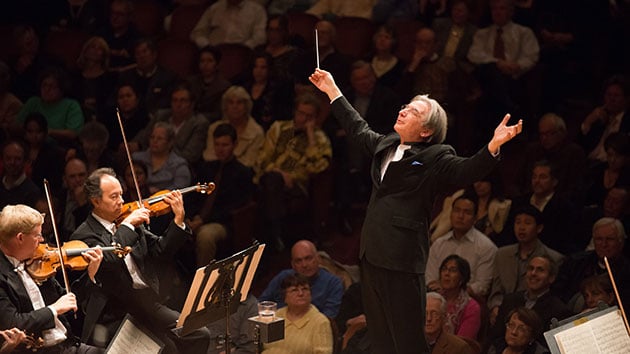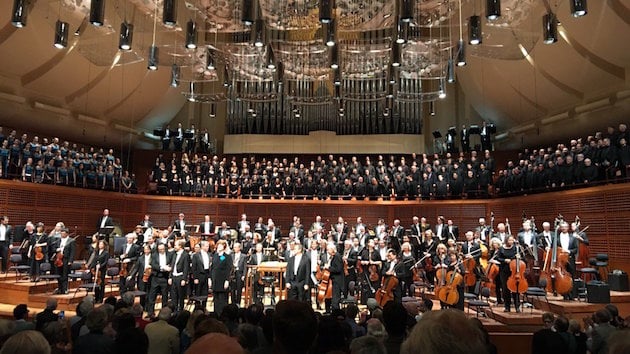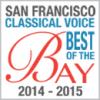
Now in its third year, SFCV’s annual reader poll received significantly more nominations and final votes than ever — more than six times as many nomination votes and nearly double the final votes compared with last year. We were delighted with the sheer breadth and variety of the nominations.
The big names in town were acknowledged, of course, but we saw a lot of interest in artists and organizations that were less familiar or even brand new to us. There were nominations for 110 different opera singers, for example, over 80 chamber-music ensembles, and 60 orchestras. That’s an impressive array of music makers by any measure.
Groups receiving significant votes for the first time this year included the Thalea Quartet, the Cambrian Symphony, the Carmel Bach Festival Orchestra, and the San Francisco Girls Chorus. The latter received the lion’s share of both nominations and final votes in the choral ensemble category.
Many ensembles garnered nominations in multiple categories. Philharmonia Baroque made it to the final round in a whopping seven categories, for example, and numerous groups including Volti, Left Coast Chamber Ensemble, and Voices of Music were nominated in one or more ensemble types as well as for specific performances.
The primary editorial contribution to the poll was our effort to craft categories that would allow for a range of nominations that embraced organizations and music of all sorts: large and small, mainstream and fringe, old and new. Ultimately, the choice for Best of the Bay was yours, though, and your choices were decisive: There were clear winners in nearly every category, with just a few close contests.
Here’s how you voted.
Best Opera Singer: Joyce DiDonato

Mezzo-soprano Joyce DiDonato won by more than a length in one of our most heavily nominated races, with Carrie Hennesey a distant second. DiDonato, long a favorite in the Bay Area, also won in the best vocal recital performance category (see below). In this review, SFCV’s critic expressed her broad appeal: “There may be other mezzos, past and present, who have the gift of diving even deeper into the emotional well of humanity’s shared heart, but few have ever been able to do so with the ease, audience-friendly patter, and technical mastery of Joyce DiDonato.”
Best Chamber Ensemble: Voices of Music

In another crowded field, early-music ensemble Voices of Music took first place, with San José Chamber Orchestra a solid second. They have been called “the most popular Early Music ensemble in the United States and one of the most popular classical-music ensembles in the world today.” Our reviewer was particular enamored of their recent performance of Pergolesi’s Stabat Mater.
Best Choral Group: San Francisco Girls Chorus

The San Francisco Girls Chorus is on fire — and in the headlines — lately, with an ambitious program of new music, interesting collaborations, and unique performance opportunities on the horizon. As our critic noted in his review of their winter concert, “Great art can seem effortless, but it is obvious that the young women of the SFGC possess great musical and stage discipline and work hard to reach their praiseworthy level of effortlessness.” They certainly motivated their followers to deliver an overwhelming victory in this category. Schola Cantorum earned second honors in for best group and also for best choral performance.
Best Dance Soloist: Yuan Yuan Tan

The Asian edition of Time magazine named Yuan Yuan a “Hero of Asia” and Hong Kong’s Phoenix TV named her one of the world’s most influential Chinese. She’s certainly a hero here for her work with the San Francisco Ballet, where she’s been a principal dancer since 1997. She might be best known for Nutcracker (Grand Pas de Deux Ballerina and Sugar Plum Fairy) and Swan Lake (Odette/Odile), but she has graced the boards with a wide variety of roles. Smuin’s Erin Yarbrough-Powell took second place.
Best Early Music/Baroque Ensemble: American Bach Soloists

There’s nothing fringe about the early-music scene in the Bay Area, and we boast dozens of world-class ensembles championing great music from centuries past. This year the American Bach Soloists reclaim the crown they won in our first Best of the Bay poll, with a decisive vote over second-place Philharmonia Baroque. The ABS Summer Festival took honors in that category as well (see below). Our writers consistently praise ABS’s efforts to foster emerging artists, as this review of Handel’s La Resurezzione illustrates.
Best New Music Ensemble: Kronos Quartet

We can't quibble with giving the laurels to the Kronos Quartet in this category. Their cumulative impact on the new-music scene in the Bay Area and around the globe is undeniable and ongoing. They have commissioned more than 900 new works and arrangements for the string quartet, and are continuously pushing the boundaries of chamber music into new territory. Most recently, their performance at the Exploratorium heard them playing an interactive score in real time interspersed with sound-generating live data feeds from the solar eclipse. A recent SFCV review lauded the group for intriguing collaborations and for their ensemble playing, which our writer praised as stronger than ever. Another review described them as always looking forward in their quest to cultivate new music. The innovative Left Coast Chamber Ensemble earned second place in this category.
Best Orchestra: San Francisco Symphony

We scramble to cover all of the great symphonic music offered in the Bay Area, but we were a little stunned when we looked at the full roster of nominations in this category at just how many orchestras we have here. Despite the welcome variety, there’s was one clear favorite, and it’s hard to deny the pedigree and accomplishments of the San Francisco Symphony, winner for the third consecutive year. Philharmonia Baroque got the nod for second place. While admired for its peerless renderings of the classic repertoire, our reviewer admired the symphony for taking risks with an edgy program of more modern music.
Best Conductor: Michael Tilson Thomas

No big surprise that Michael Tilson Thomas took top honors in this new category. The energetic conductor and composer has been a tireless advocate of great music of all ages, from the cutting edge of the new to lesser-known masterpieces of the past. We like this review of a recent concert featuring the work of John Adams, a composer Tilson Thomas has championed over the years. Philharmonia Baroque’s beloved Nicholas McGegan was the runner-up, and Eric Kujawsky and Scott Krijnen each received plaudits for their terrific work with community orchestras.
Best Recital Soloist: Jon Nakamatsu

Pianist Jon Nakamatsu frequently graces SFCV’s digital pages, and our reviewers inevitably find him disarmingly charming, technically dazzling, and entirely musical. A recent profile of the artist offers insight into his appeal, and a recital review aptly describes why he took the blue ribbon here. Pianist András Shiff and tenor Brian Thorsett were close behind in what was our most closely contested category.
Best Opera Performance: Le Temple de la Gloire, Philharmonia Baroque Orchestra & Chorale

The Philharmonia Baroque’s impressive re-creation of Jean-Philippe Rameau’s 1745 opera-ballet Le Temple de la Gloire was a blockbuster hit by any measure. Our review of the spectacle was a rave: “Brimming over with the splendors of this taut but lushly expressive French Baroque score; a formal but moving text by Voltaire; diverse solo, ensemble, and choral singing; poised and sensual dance; delectable costumes; painterly backdrops and projections; and for good measure a quizzical ostrich in the final act, this joint endeavor by Cal Performances and Centre de musique baroque de Versailles gratified on multiple levels.” S.F. Opera’s summer presentation of Rigoletto with best-opera-singer nominee Quinn Kelsey was the second-favorite choice.
Best Chamber Music Performance: Beethoven Quartet Cycle, Takács Quartet

Over the course of the past season the revered Takács Quartet performed the complete cycle of Beethoven’s string quartets through the auspices of Cal Performances. Thematic context for each performance was provided by Takács first violinist Edward Dusinberre’s book Beethoven for a Later Age: Living with the String Quartets, and the concerts were augmented by open rehearsals, masterclasses, public discussions, and preconcert talks. You can read our review of one concert here. Elevate Ensemble’s “Stravinsky Reconstructed” program took second place.
Best Choral Performance: Verdi Requiem, Masterworks Chorale

For 54 years now the Masterworks Chorale has been delivering superb choral music performed by a community chorus of over 100 voices, often in collaboration with other choirs, choruses, and instrumental ensembles. Their rendition of Verdi’s Requiem paired them with a 46-piece orchestra, all under the baton of Dr. Bryan Baker. Schola Cantorum’s performance of Monteverdi’s Vespers was in a dead heat with the Pacific Boychoir/S.F. Symphony performance of Orff’s Carmina burana for second place.
Best Dance Performance: Rameau: Le Temple de la Gloire, New York Baroque Dance Company

This happy collaboration between Philharmonia Baroque and the New York Baroque Dance Company took top honors in two categories, and was a contender in several others. The period ballet offered by this preeminent troupe captured our readers hearts this year, with nearly twice as many votes as second-place S.F. Ballet for their presentation of Liam Scarlett’s Frankenstein.
Best Early/Baroque Performance: Bach: St. Matthew Passion, California Bach Society

Our review of this performance concurred with popular opinion. Our critic wrote that the choir sang with technical assurance and expressive command throughout the afternoon and into the evening: “The listener had the uncanny, elevating sense of hearing every voice devoted to a single purpose. It was, in the broadest sense of the term, a musically spiritual experience.” The ubiquitous Le Temple de la Gloire was a close second.
Best New Music Performance: Luis Andre Cobo: Piano Concerto, Cambrian Symphony

As noted above, the Cambrian Symphony was a surprisingly strong contender in a number of categories, and they took first place with the world premiere of an engaging new piano concerto from composer Luis Andrei Cobo. The piano soloist was Tamami Honma, who was also nominated in the best recital soloist category. The performance was part of the symphony’s “A Tale of Three Cities” program in June. Second honors went to the San Francisco Contemporary Music Players’ performance of Ligeti’s Chamber Concerto.
Best Orchestral Performance: Berlioz: Requiem, San Francisco Symphony

Guest conductor Charles Dutoit led the S.F. Symphony and Chorus in this winning performance of Berlioz’s epic Requiem. Our reviewer was most impressed with how the 300 musicians on stage managed the quieter moments of the masterwork. In the review he wrote: “... it wasn’t the great eruptions that registered most deeply. Instead it was passages like the softly shining a cappella chords of ‘Quaerens me,’ which captured the hushed supplication of the text.” The Peninsula Symphony’s reading of Holst’s The Planets took second honors.
Best Instrumental Recital Performance: András Schiff

Hungarian-born pianist András Schiff edged out fellow keyboard wizard Yuja Wang for best instrument recital performance for his all-Schubert concert at Davies last spring. Our profile of Schiff describes him as delivering “... exceptional clarity in the way he presents voices and phrases, and, as with all great artists, he makes everything look and sound both effortless and completely logical.” For more on Schiff, read one of our many reviews of his recitals.
Best Vocal Recital: In War & Peace, Joyce DiDonato

This past season Joyce DiDonato embarked on an ambitious recording and performance program that presented 15 arias the confronted themes of war and peace. Accompanied by the Italian period-instrument ensemble, Il Pomo d’Oro, DiDonato presented the songs as a way to grapple with a big question: “In the midst of chaos, how do I find peace?” We presented an extensive interview with DiDonato previewing the winning recital last fall. Soprano Winnie Nieh and tenor Kyle Stegall vied for second place.
Best Large Venue: Davies Symphony Hall

The Louise M. Davies Symphony Hall has its detractors, but they weren't voting in this poll. The handsome, and sonically improved concert venue was the popular favorite by a length, with the San Francisco War Memorial Opera House coming in a distant second. This is the third win for Davies.
Best Small Venue: San Francisco Conservatory of Music

The new performance spaces at the SFCM range from the 450-seat Caroline Hume Concert Hall, which accommodates the Conservatory’s orchestra, and the more intimate Sol Joseph Recital Hall and Osher Salon, which are perfect for chamber ensembles and solo recitals. The venerable St. Mark’s Lutheran was in a dead heat for second with Le Petit Trianon Theatre in San José.
Best Festival: American Bach Soloists Summer Festival & Academy

This is the second win for the American Bach Soloists in this category, and they won it in a landslide. The nearest competitors were the West Edge Opera Festival and the Valley of the Moon Festival. The concerts feature soloists from the summer Academy program, and our reviewer raved over their recent presentation of Purcell’s King Arthur. West Edge Opera Festival, last year’s winner as “Best New Discovery,” took second place.
Best Discovery: Cambrian Symphony

The Cambrian Symphony was a discovery for SFCV this year thanks to enthusiastic voting by their supporters. “Comprised of community-minded individuals that act not only as musicians on the stage, but as doctors, lawyers, engineers, designers, research scientists and educators throughout the Bay Area,” the community orchestra prides itself on providing a supportive, play-along environment for emerging musicians. Under Scott Krijnen’s baton, the Cambrian Symphony is in its fourth year of collaboration with the San José Dance Theatre on Nutcracker, and they are entering their second full season of concerts on their own. The Valley of the Moon Festival and the pop-up collaborative orchestra, One Found Sound, were runners-up.



